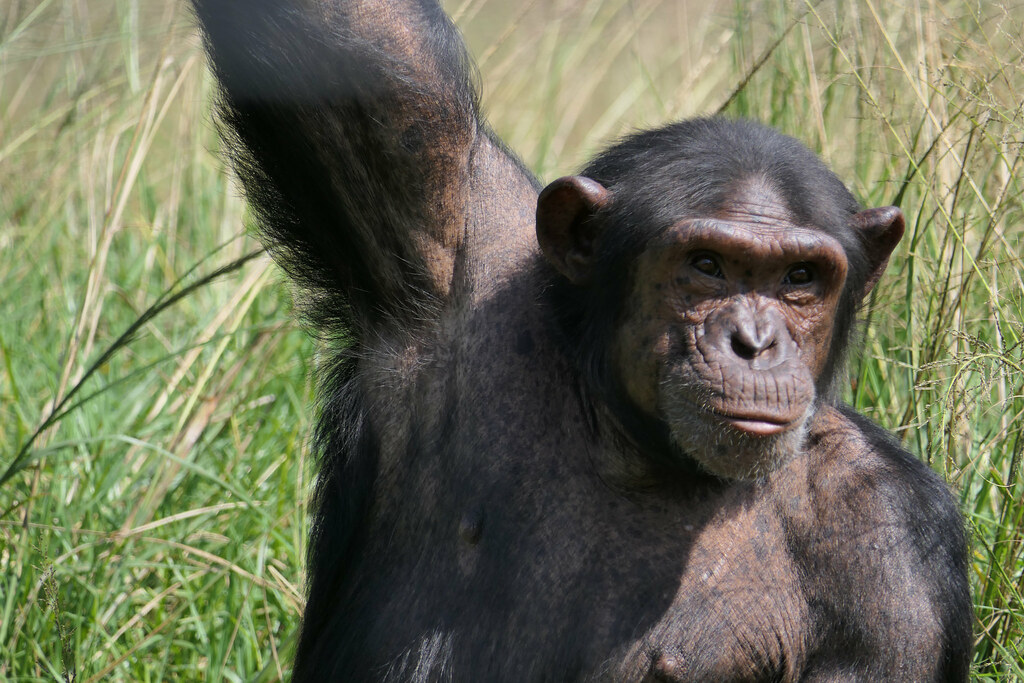The Chimpanzee
Because chimpanzee behavior is too complex to analyze in a single day, one must take their time and pay close attention to every aspect of chimp existence. In Uganda, chimpanzees are one of the endangered mammal species. Although it can be done in other locations, such as Kalinzu forest along the Kasese-Mbarara highway, Kyambura gorge in Queen Elizabeth National Park, Ngamba island in Lake Victoria, Kaniyo Pabidi of Murchison Falls, and Bugondo forest, among others, Kibale National Park is the primary destination for chimpanzee trekking and chimpanzee habituation activities.
With more than 1500 chimpanzees, Kibale National Park is home to the largest chimpanzee population on the entire African continent. It is also known as the primate capital of the world since it boasts the greatest number of primates on the continent, both in terms of numbers and species. After the mountain gorillas, chimpanzees are the most entertaining and fascinating primates to observe, and they are the main attraction of primate safaris in Uganda and other African nations.
Given that they share about 98% of the human genetic blueprint, or DNA, chimpanzees are the most closely related creatures to humans. Given that humans and chimps are believed to have shared an ancestor approximately eight million years ago, this fact may lead you to believe in the early scientists’ statements that humans descended from chimpanzees. This archeological discovery may have its roots in DNA. Although chimpanzees are wild animals in the wild, they have been captured and domesticated as pets for many years. Additionally, habituated chimpanzees are accustomed to human interactions; this process can take up to two years.
As diurnal creatures, chimpanzees begin their days early in the morning. Contrary to how the world changes with time, chimpanzees spend the night sleeping despite being highly active throughout the day. The young ones are quite lively and enjoy jumping from one branches to another, but they are still under the mother’s watchful eye. Throughout the day, they only forage and search for food and rest in the tree branches during hot weather.
Chimpanzees travel in communities, which are somewhat big groups of 30 to 60 individuals. The male chimpanzee leads the group through the woodland trees after waking up early. African rainforests like Kibale Forest, woods, and certain grasslands like Queen Elizabeth National Park are easily adapted to by chimpanzees.
Chimpanzees are known to walk on all four limbs, or knuckle walk, and occasionally they stand and walk like people. The powerful chimpanzees swing from tree to tree using their hands. Although they spend most of their time on trees, where they mostly eat, they also remain on land. As they construct their nests by bending tree branches and lining them with twigs and leaves, they also sleep in the trees.
The primary diet of these primates consists of fruits and plants. They only consume the ripening fruits since they are picky eaters. Chimpanzees also consume termites, eggs, and occasionally the flesh of small animals and birds. Meat is merely an addition to their primary vegetarian diet; they consume insects as snacks throughout the day.
These primates are distinct from other wild animals. When looking for food, the chimpanzees are able to use tools. The termites are taken from the anthill by the chimpanzees using sticks that they construct. The chimpanzees crack their nuts with stones. In order to absorb water for drinking, they also use chewed leaves as a sponge. They are actually going so far as to learn some human sign language.
Chimpanzees give birth to one offspring, usually at any time of the year, and the female has no set schedule for reproduction. The moms give their babies a lot of attention, and when they begin to move, the babies cling to their mothers’ backs until they are two years old. The male chimpanzee is not regarded as an adult until he is 16 years of age or older, while the female reaches sexual reproductive maturity at the age of 13.
The link between chimpanzees and humans is demonstrated by all of the aforementioned behavioral traits. But because of poaching, deaths, and removal from their natural habitats to be kept as pets or in circuses, this mammal species of apes has suffered greatly at the hands of people. As a result, the number of chimpanzees in Africa has decreased. The only place where you have a 100% possibility of seeing chimpanzees anywhere in the park, including near your lodging facility, is Kibale National Park, also known as the Primate Capital of the World.

